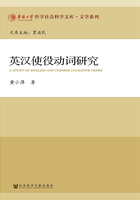
3.2 依据形态的分类
根据形态来划分,可分两类。
第一类为缀加含显性使役意义词缀类,指带使役词缀的使役动词。第二类为无缀加含显性使役意义词缀的使役动词,即转化而来的使役动词,也可看作缀加了零形,亦称同形转换(见第七章“转化而来的使役动词”)。下面讨论英语中含有“使动”意义的前缀和后缀。
含有“使动”意义的前缀主要有:be-, de-, dis-, en-, em-, con-, com-。
be-
be- 源自德语,接在名词或形容词之前,表示(1)“使……”(2)“饰以……”(cover with)。例如:
(30)We mustn't belittle her outstanding achievement. (CCED)(我们不能贬低她的出色成就。)
(31)If a person is belittled, they are humiliated and made to appear lit tle. (Dixon, 2014: 184)(所谓有人被贬损,指这种人遭到羞辱以致看上去卑微。)
语义为“饰以……”时,多用状态被动式。例如:
(32)Someone may comment the duchess is be-jewelled, that her husband is be-whiskered, and that the judge is be-wigged. (Dixon, 2014: 184)(有人评说公爵夫人以珠宝装饰,她丈夫以胡须装饰,法官以假发装饰。)
网上还常见:a bejeaned artist/girl(穿牛仔装的艺术家/女孩)
(33)Phil Schiller and Eddy Cue are suitably bejeaned and relaxed as they welcome me for a talk. (Fry, 2010)(Phil Schiller和Eddy Cue穿了合身的牛仔装,以放松的姿态迎接我来聊聊。)
其他例词:
becalm使静止不动(be+Adj)
bedazzle使眩惑(be+V)
befall使遭遇(be+V)
befool愚弄(be+N)
befriend使成为朋友(be+N)
becloud遮掩(be+N)(遮盖/修饰物)
beflower用花覆盖(be+N)(遮盖/修饰物)
en-, em-
en-, em- 源自罗曼语,接在名词和形容词之前,常表达两种意义。
(1)表示“置于……”。例如:
A.把某物环绕另一物或置于另一物之上(put an X around or upon Y)
encircle包围(en+N)
encrown加冕(en+N)
B.把某物置于另一物之中(put Y in or on X)(Dixon, 2014: 189)
encage关在笼中(en+N)
encase包住(en+N)
entomb埋葬(en+N)
entrap使陷入罗网(en+N)
encode编码(en+N)
enthrone使登基(en+N)
(2)表示“致使”。例如:
(34)If you enable someone to do something, this means that you make them able to do it.
enslave (=make become a slave)使成奴隶(en+N)
empower (=make have power)使威风(em+N)
entitle给……称号(en+N)
embow使成弓形(en+N)音变后成了(em+N)
empurple使发紫(em+N)
enlarge扩大(en+Adj)
enfeeble使衰弱(en+Adj)
以下例词的使役含义较为抽象:
endanger people's life(=make people's life dangerous/put people's life in danger)(使濒临危险)
entrust something to somebody(=make them responsible for looking after it)(委托……)
enforce实施(en+N)
embitter使受苦(en+Adj)音变后成了(em+Adj)
embody使具体化(em+N)
ennoble使高贵、使成为贵族(en+Adj)
enliven使活泼(en+N+en)
de-
de-源自拉丁语,可与词根结合或加在动词、形容词前,表示“降、反、去、解、除、消,脱”(to undo, to make down, to make away)。
decline sb's invitation 谢绝某人的邀请(de+word stem)
detract one's attention 分散注意力(de+word stem)
decompose the material分解物料(de+V)
decentralize energy分散能源(de+V)
devalue its currency 使贬值(de+N)
derail the train使火车脱轨(de+N)
derail the peace process破坏和平进程(de+N)
dis-
dis-源自拉丁语,一般加在动词及名词或形容词前来构成动词,表示“反转、取消分离,夺去,无”(to undo, to make not, to remove, apart, lack of)。
(35)The police disarmed the remaining suspects. (警察缴了残余嫌疑犯的械。)(21st CUECD)
(36)But the sight of her in tears disarmed him. (看见她落泪他不那么生气了。)“disarmed him”指“make him less angry”)
(37)disarm an argument(使论点没有说服力)(21st CUECD)
disable使不能行动(dis+Adj)
dishonest不诚实(dis+Adj)
discourage使泄气(dis+N)
discolor使褪色(dis+N)
disconnect使分离(dis+V)
disqualify取消资格(dis+V)
disjoin拆散(dis+V)
com-, con-, cor-
com-, con-, cor- 源自拉丁语,除表示“一起”外,还表示“加强、使成”之意。
confirm my suspicion 证实我的猜疑(是对的) (confirm 使坚定)(com+Adj)
comfort使舒适(com+word stem)
corrupt使败坏(cor+word stem)
corroborate使巩固(cor+word stem)
comminute使成粉末(com+Adj)
configure使成型(con+N)
correlate使相互关联(cor+V)
commove使动乱(com+V)
含有“使动”意义的后缀主要有:-ate, -en, -fy, -ish, -ize。
-ate
-ate源自罗曼语,表示“使成为……”“使化合”(cause X to happen),可分两组。
A.源自带词尾 -atus 的拉丁语词,词根与后缀不可分离(Dixon, 2014: 190)
terminate使终止
generate使形成、使产生
necessitate使必须
triangulate使成三角形
frustrate使沮丧
contaminate污染
B.词根与后缀可分离
motivate激发
例如:
(38)If you motivate someone you provide them with a motive for undertaking some endeavor. (CCED)
activate使活泼
hyphenat加连字符
maturate使成熟
alienate使生疏
evaporate使脱水
validate使合法化,使生效
-en
-en后缀源自德语,接在形容词后表示“变成”(to become)和“使成为”(cause to become)。
常用在表示物质特性的形容词后,不及物用法表达“自变”过程,及物用法表达“使役”过程。例如:
(39)The river deepens just below the village. (=The river becomes deep just below the village. )
(40)He deepened the grave. (=He made the grave deep. )
moisten使润湿
ripen使成熟
soften使变软
loosen使松
sweeten使甜
roughen变粗
-en常用在表示维度体量方面的形容词后。例如:shorten, widen, thicken, fatten, flatten(把……弄平,使倒伏),但是没有单词∗longen,∗strongen, ∗highen。这是因为音系学方面的语音制约条件不允许出现∗longen, ∗strongen, ∗highen,接在形容词后则发音无法处理,发音不和谐,于是,表示“加长、增强、提高”时,-en 不接在形容词而接在其名词之后:lengthen, strengthen, heighten。
-(i)fy
-(i)fy最早源自罗曼语,接在罗曼语和德语词根之后,常用来表示“使成,使……化”〔(make)take on the character of X〕,可分几个小类。例如:
A.施事使受事变成某物(A makes O into an X)
acidify, liquefy, gasify, fishify
B.施事将受事置于某物之内(A puts O in/on X)
classify, codify
C.施事将某种状态赋予受事(A provides X to /for O)
glorify, beautify, electrify, dirtify
D.施事将某物作为受事的代表(A represents X of /for O)
exemplify, signify
E.施事使受事具有某物的特点〔A makes O have(some of)the characteristic of X〕
personify, ladify, countrify, citify, objectify
以-(i)fy结尾的动词多为常用使役动词。例如:
simplify简化
purify净化
solidify使固化
falsify伪造、证明……是假的
prettify美化
uglify丑化
magnify放大
identify使等同于
sanctify使圣洁
verify证实、证明……为事实
amplify增强、放大
这些使役动词将使役过程和使役结果集于一身,即同时担当了谓词和结果补语,这一点与翻译过来的汉语不同,汉语的补语在表层中出现。例如:

这一英汉差异使得-(i)fy等词化使役动词成为难点动词,因为像justify这样一类使役动词合并了使役过程和结果,其相对应的汉语译文却没有语义合并,表层“动词+宾语+补语”齐全,因此,翻译时需将英语中隐含的语义加以展开。例如:
(41)The course of events fully justifies our views. (事情的发展完全证明我们的意见是正确的。)
(42)The extra profit justifies the investment. (超额的利润说明这项投资正确。)
(43)How can you justify your rude and foolish behavior? (你怎能为你粗鲁而愚蠢的行为辩护?)
(44)Nothing can justify such careless mistakes. (如此粗心的错误不可原谅。)
(45)Is he justified in all his actions? (他的这许多行为是正当的吗?)
(46)Justify their expensive education to themselves(=make their ex pensive education reasonable to themselves)(向他们自己证明对得起高昂的学费。)
-(i)fy动词与由名词转化而来的动词有语义的差别。试比较:
(47)He jokes whenever he is in a meeting. (他开会时总说笑话。)
jokes 指“telling jokes or make a joke out of something”。
(48)They jokify in the meeting. (他们在会上说笑话活跃气氛。)
jokify指“chatting in a jokey sort of way to liven up a conversation”。
(49)He dirtied the hall. (他把大厅都弄脏了。)
dirty指“make the hall dirty, that is too bad”。
(50)He dirtified the hall. (他把大厅搞得有点脏了。)
dirtify指“make the hall a little bit mucky, but it does not really matter at all”。
-ish
-ish表示“造成,致使,令”。
furnish the house 给房子布置家具(=put furniture into the house)
publish发表
flourish繁荣
establish建立
diminish减少
extinguish熄灭
nourish滋养
-ize, -ise(详见第八章讨论)
-ize, -ise源自希腊语,接在希腊语和罗曼语词根之后,表示“做成,变成,……化”。
(51)A good education civilized the people. (良好的教育使人们文明起来。)
digitize the film (=to put information into a digital form)(数据化)
victimize sb (=cause sb. to become a victim)(使成受害人)
finalize (=cause sth. to become a final version)(使定案)
popularize (=make sth. popular)(使普及)
normalize (=make sth. become normal)(使正常化)
harmonize (=make sth. become harmonious)(使调和)
standardize (=change sth. so that they all have the same features) (使标准化)
同时含有“使动”意义的前缀和后缀的词例:
demoralize指“使士气低落、使意志消沉、使陷入混乱”。
(52)The illness demoralized him and recovery took several weeks. (“demoralized him”指“to reduce or destroy someone's courage or confidence”)
(53)Your perspective can demoralize you or motivate you, it can get you the results you want or even snatch the opportunities from you. (你的个人想法可以使你消沉,也可以使你备受鼓舞,它可以使你获得你希望的结果,也可以剥夺你成功的机会。)
(54)I hope the result of my research will enlighten my colleagues. (我希望我的研究成果会对我的同事有所启发。)
(55)The counseling staff have to enlighten the students on the dangers of drug abuse. (咨询人员必须使学生明白吸毒的危险。)
汉语也有形态型,但使役意义的动词标记较少,这可能是汉语名转动等词性转换比较发达使然。“……化”是汉语最常用使役动词的标志词尾,例如:三围魔鬼化,收入白领化,情调小资化,家务甩手化。汉语中作名词的词缀较多,例如:老者,拼客、手工吧、少壮派、姑娘家、捧车族。